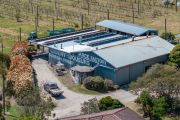
Big property players look to US for refinancing
Half a dozen listed and unlisted real estate trusts and companies have just locked in new financing, with some tapping the US private placement market where there is strong demand from global investors but not necessarily cheaper debt.
Retail landlord Vicinity locked in $400 million in Australian medium term notes (AMTN) while QIC Global Real Estate has just priced $200 million in senior notes in the US private placement market.
The Long WALE Investment Partnership, 45 per cent owned by Charter Hall Long WALE REIT, issued $200 million in notes in the private placement market at an all-in cost of debt of 5 per cent, while pub owner ALE Property Group secured a $150 million notes issue in the local market at 4 per cent.
ALE Property Group managing director Andrew Wilkinson said he considered both the Australian corporate bond market and the US Private Placement market for the recent refinancing.
“ALE had successfully tapped the AMTN market in 2014 and chose that option again this year as it was the most competitively priced market for the term it was seeking,” Mr Wilkinson said. “Had ALE wished to issue over a longer term it may have been more competitive to source the US private placement market.
“We were delighted with the strong response we received from a wide range of domestic and international institutional investors, a number of whom have participated in ALE’s various debt issues since 2003. The competitive cost of the refinancing is testament to the market’s positive view of ALE’s business outlook and capital structure.”
Flexibility of resources
Citi’s managing director and head of debt capital markets for Australia and New Zealand, Ian Campbell, said he was seeing more of the smaller companies trying to enhance the flexibility of their funding sources.
“Boards don’t want to be wedded to one type of funding source,” Mr Campbell said.”There has been a rush of smaller debt raisings of late and we think part of this trend comes down to risk mitigation but also the market has been in strong issuer-friendly mode for a while now and taking advantage of those conditions makes sense.”
The US private placement market is attractive to Australian companies because of a feature known as the delayed drawdown which allows companies to secure the financing terms but not be forced to immediately take them up.
“The delayed drawdown feature allows a borrower to take down funds over an extended time, up to three months, which is different to the public debt markets that typically trade date five days when funds are received.”
Ongoing support
This feature allows the company to receive the funds closer to when they are needed.”There is plenty of demand for the debt from big US insurance and pension funds,” Mr Campbell said. “Market conditions have seen strong demand from investors both domestically and abroad, which has assisted in spreads moving tighter.”
The QIC Shopping Centre Fund recently undertook an investor roadshow looking to raise debt in the US Private Placement Market.
It was the fund’s inaugural debt issuance in that market, and helped to diversify its debt funding sources and managed by NAB & Bank of America Merrill Lynch as well as Westpac. The fund raised $US200 million ($268 million) across 10 and 12 year maturities.
Fellow retailer Vicinity raised $400 million earlier this year.
Vicinity’s chief financial officer, Richard Jamieson, said: “We are pleased with the ongoing support of Vicinity from both domestic and Asian bond investors which has resulted in competitive pricing for our notes and extends the duration of our financing facilities.”
He said the proceeds of the issue would be used to repay existing bank facilities and for general corporate purposes.










